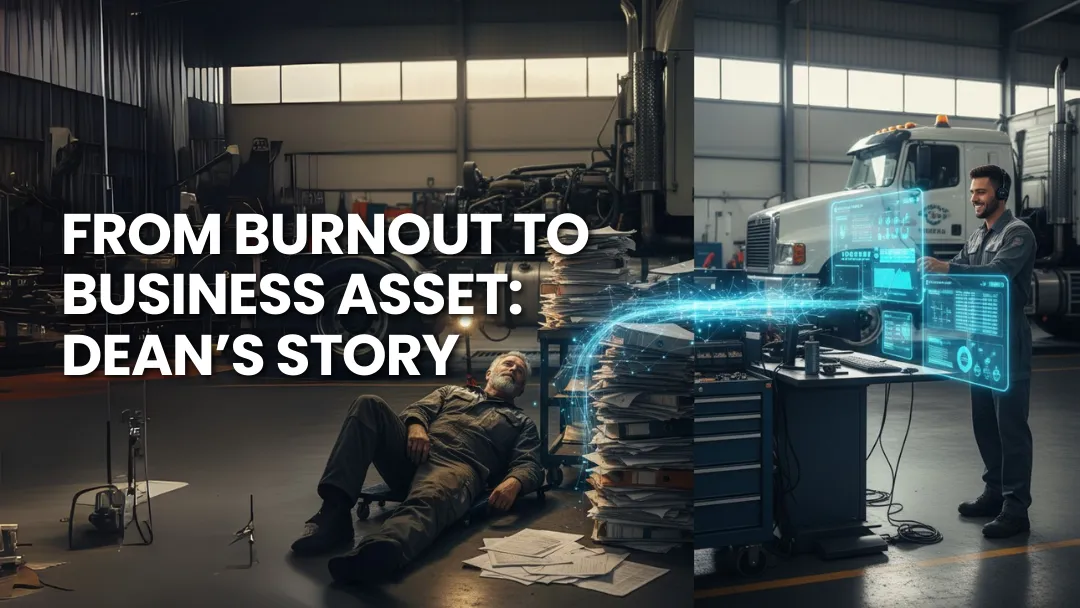
From Burnout to Business Asset: Dean’s Story
Running a small business should be rewarding. But for many owners, it feels like an endless grind — juggling calls, customers, staff, and admin. That’s the story of Dean, a heavy vehicle workshop owner in Brisbane. His experience highlights the struggle of doing it all yourself and the opportunity that comes from building smart systems.

The Solo Business Struggle
Dean takes huge pride in his work. His customers love him for the quality service and the dedication he shows. His reputation in the industry is second to none. But behind the scenes, the story is tougher:
Finding workers is nearly impossible. The few he hires often lack basic reliability or skill. Job cards get messed up, workmanship isn’t up to scratch, and Dean ends up re-doing work to maintain his standards.
Every hat is on his head. He answers phones, diagnoses faults, orders parts, chases suppliers, checks quality before trucks leave, pays bills — everything.
His wife helps out, taking phone calls a couple of days a week. But without technical expertise, those calls just pile up as callbacks.
Late nights under the hoist. To meet deadlines and keep customers happy, Dean often works until 9:00pm finishing jobs.
The workshop is profitable and the customers are loyal. But Dean is exhausted. There’s no lifestyle balance. And here’s the deeper problem: the business isn’t a saleable asset.
Right now, the business is Dean. If he wanted to sell, there are no systems a buyer can step into. For most buyers, that makes it unattractive. They don’t want to buy a person’s stress — they want a machine that runs on its own.

The Turning Point: Systems That Support, Not Replace
The good news is Dean’s situation isn’t unique — and it’s fixable. The key is introducing systems that reduce the pressure, protect the quality of service, and create a foundation for long-term value.
Here are six areas where systems can transform a workshop:
AI Receptionist & Smart Front Desk
Every call doesn’t have to go to Dean. Urgent calls can patch through, but routine bookings can be handled automatically. Hannah, the AI receptionist, filters spam, answers questions, and lets regulars book directly into his calendar. That means fewer interruptions, more jobs, and less chaos.Automated Reminders
Instead of waiting for breakdowns, Smart Front Desk can send reminders based on service intervals or kilometres driven. Customers book on time, trucks stay on the road, and Dean doesn’t have to remember who’s due for what.Quick Quote Tool
Quoting every job eats into Dean’s time. A simple online tool could let customers answer a few questions, receive an estimated price, and either book or request a callback. It keeps them from shopping around while Dean is too busy to answer.Reputation Management
Dean’s great work should translate into a steady stream of reviews. Automated requests and managed responses ensure his reputation grows online, not just by word of mouth.Workshop Systems
Mechanics can use voice-to-text to complete job cards. Suggested parts orders can be generated automatically. Less paperwork, fewer mistakes, and smoother workflow.Admin & Bookkeeping
With integrated job scheduling and Xero, jobs flow into invoices, payments are matched automatically, and bank recs take minutes instead of hours. It’s admin without the headache.
The Power of Baby Steps
The biggest mistake? Trying to change everything overnight. Dean doesn’t need a complete overhaul tomorrow — he needs to start small and build confidence.
Step one: Bring in Hannah and Smart Front Desk to handle calls and bookings.
Step two: Add Review Automation to grow his online reputation.
Step three: Once the front-end is working, integrate workshop software with bookkeeping and parts management.
Each step eases the pressure, saves time, and adds value. Over time, the workshop shifts from being Dean’s job to being Dean’s business.

From Exhaustion to Asset
Here’s the bigger picture: once these systems are in place, Dean’s workshop stops depending solely on him. It becomes a structured, systemised operation that anyone could run. That’s the difference between owning a stressful job and owning a saleable asset.
This matters not just for Dean, but for thousands of business owners — especially Baby Boomers. Many will one day want to sell, but without systems, buyers walk away. They don’t want to buy burnout; they want to buy a business that runs.
Dean’s story shows what’s possible. By taking small, deliberate steps, he can reclaim his time and lifestyle today — and transform his workshop into a valuable business tomorrow.
